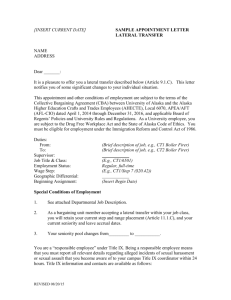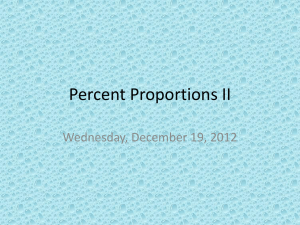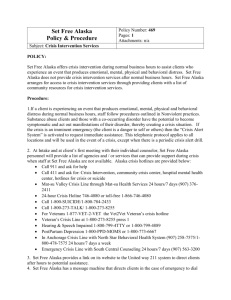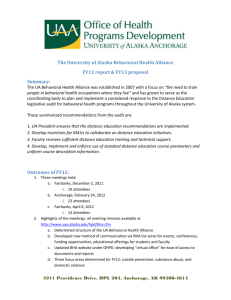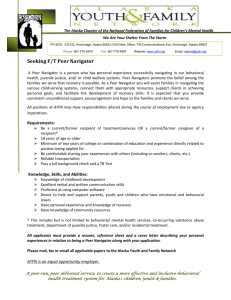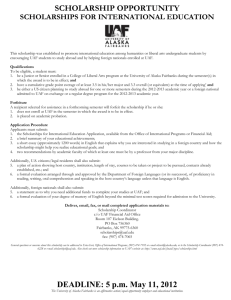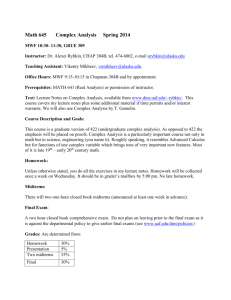Behavioral Health Funding Initiative
advertisement
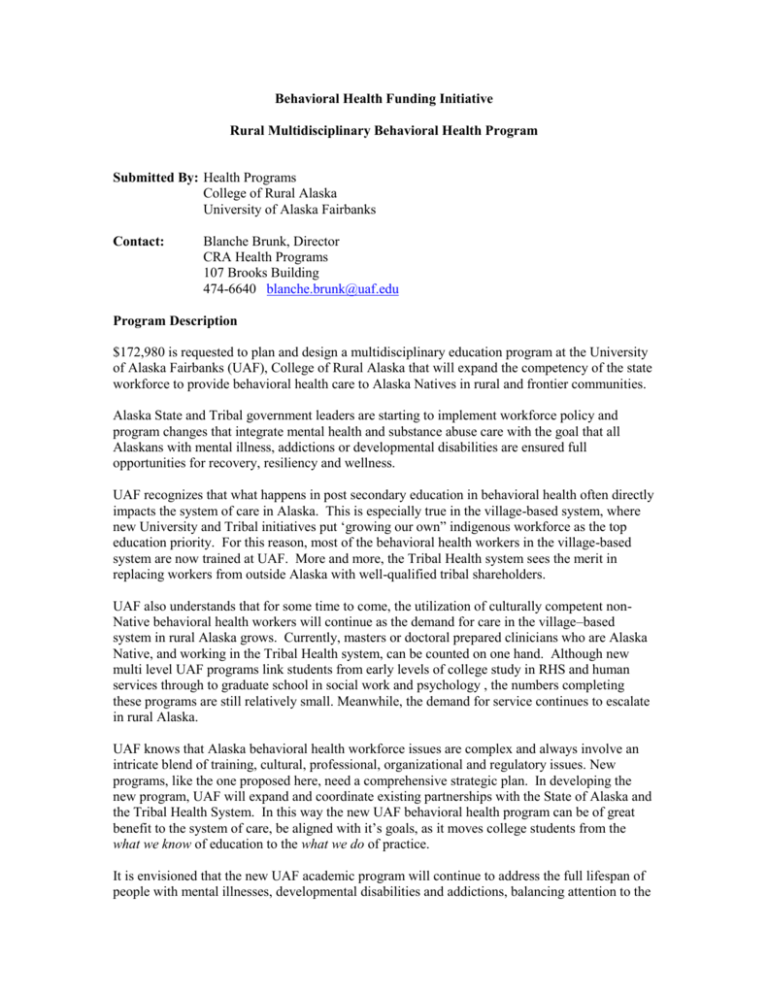
Behavioral Health Funding Initiative Rural Multidisciplinary Behavioral Health Program Submitted By: Health Programs College of Rural Alaska University of Alaska Fairbanks Contact: Blanche Brunk, Director CRA Health Programs 107 Brooks Building 474-6640 blanche.brunk@uaf.edu Program Description $172,980 is requested to plan and design a multidisciplinary education program at the University of Alaska Fairbanks (UAF), College of Rural Alaska that will expand the competency of the state workforce to provide behavioral health care to Alaska Natives in rural and frontier communities. Alaska State and Tribal government leaders are starting to implement workforce policy and program changes that integrate mental health and substance abuse care with the goal that all Alaskans with mental illness, addictions or developmental disabilities are ensured full opportunities for recovery, resiliency and wellness. UAF recognizes that what happens in post secondary education in behavioral health often directly impacts the system of care in Alaska. This is especially true in the village-based system, where new University and Tribal initiatives put ‘growing our own” indigenous workforce as the top education priority. For this reason, most of the behavioral health workers in the village-based system are now trained at UAF. More and more, the Tribal Health system sees the merit in replacing workers from outside Alaska with well-qualified tribal shareholders. UAF also understands that for some time to come, the utilization of culturally competent nonNative behavioral health workers will continue as the demand for care in the village–based system in rural Alaska grows. Currently, masters or doctoral prepared clinicians who are Alaska Native, and working in the Tribal Health system, can be counted on one hand. Although new multi level UAF programs link students from early levels of college study in RHS and human services through to graduate school in social work and psychology , the numbers completing these programs are still relatively small. Meanwhile, the demand for service continues to escalate in rural Alaska. UAF knows that Alaska behavioral health workforce issues are complex and always involve an intricate blend of training, cultural, professional, organizational and regulatory issues. New programs, like the one proposed here, need a comprehensive strategic plan. In developing the new program, UAF will expand and coordinate existing partnerships with the State of Alaska and the Tribal Health System. In this way the new UAF behavioral health program can be of great benefit to the system of care, be aligned with it’s goals, as it moves college students from the what we know of education to the what we do of practice. It is envisioned that the new UAF academic program will continue to address the full lifespan of people with mental illnesses, developmental disabilities and addictions, balancing attention to the specialized needs of children and families, young adolescents, those transitioning to adulthood, adults and older adults. However, a greater emphasis on multidisciplinary approaches to teaching and learning in rural behavioral health will enhance the usefulness of existing UAF certificate and degree experiences for students, employers, consumers and families. Within the University of Alaska, the University of Alaska Fairbanks is the post secondary education and training leader in rural behavioral health education in the state system. The College of Rural Alaska is one of the major academic units of UAF. UAF is also the academic home to these rural behavioral health degree and certificate programs: M.A., MS, BA, BS Community Psychology B.A. Social Work AAS Human Services Certificate Rural Human Services Creating this multi level, multidisciplinary rural program at UAF is the first step in an incremental process to transform the entire behavioral health program within the UA system. Much of the work that is done in this initial rural project can replicated or modified to meet the needs of the rest of the UA system over the next three years. Developing the UA program first from the rural UAF perspective makes sense for at least three reasons: 1. Unusually high levels of cooperation, collaboration and respect among the academic programs in psychology, rural human services, social work and human services are evident through articulations agreements, shared faculty appointments and collaborative teaching and research. In addition sustainable partnerships and resource sharing continue between the College of Rural Alaska, CRA Health Programs and the UAF College of Liberal Arts, Departments of Psychology and Social Work. 2. At least two of the UAF rural programs are receiving national attention for the academic success they attain with Alaska Native students: the certificate program in Rural Human Services and the AAS degree in Human Services. A curiosity to understand why these programs are successful has peaked among key faculty and administration. 3. The external state and national environment favors a rural focus from the perspective of resource development for sustained and expanded funding. Program Outcomes 1. A strong, unified academic and organizational foundation on which to expand the multidisciplinary, multi level approach to the entire UA behavioral health program. 2. An exemplary post secondary program that will produce culturally competent, skilled behavioral health professionals and allied workers capable of providing quality care in rural and frontier Alaska communities. Applicability to State Needs Bill Hogan, Director of the State of Alaska DHSS Division of Behavioral Health, emphasized the importance of transforming the Alaska system with the village-based system as the core in his remarks at the Alyeska Behavioral Health Workforce Meeting in May 2004. He voiced the same position in a recent telephone conversation prior to the submission of this proposal. The Alaska Native Tribal Health Consortium has entered into a long term partnership with the University of Alaska, through recurring Indian Health Service funding, to develop and implement a sustainable behavioral health aide training program that will strengthen the village–based system. Key to this effort is the need for clear competencies that serve both clinical village practice and education and also meet certification requirements for third party reimbursement. Several key issues that align with the need for this new UAF program as well as for considered planning, are addressed in the extensive work of the June 2004 Report of the Behavioral Health Integration Stakeholder Committee, Training/Workforce Development recommendations section: Behavioral health competencies need to be reviewed for certification/licensure adoption Existing competency standards need to be unified for use in teaching and in practice. Provision of co-occurring disorder training in communities with no behavioral health providers. Training must be developed to keep pace with new behavioral health competencies that are identified. Provision of clinical supervision by distance delivery. Increase accessibility by making basic training available through distance delivery. UA could serve as a more comprehensive delivery system to support the new behavioral health approach and develop a curriculum to meet the needs od a more diversified field. Align funding and leverage workforce development and post secondary education resources. Taking a full year to plan this new multidisciplinary, multi level rural program will afford the UAF certificate and degree programs the opportunity to strengthen and expand partnerships and is a necessity not a luxury. Each of the academic stakeholders can take up the challenge posed to all post secondary mental health education programs by the 2003 President’s New Freedom Commission on Mental Health and assess the extent to which: Teaching methods use evidence-based and emerging best practices; Teaching methods have been demonstrated to be effective; The curriculum incorporates the competencies that are essential to practice in contemporary health systems; Skills are built in treating people with co-occurring mental and addictive disorders; Consumers, families and providers are educated about mental illnesses and about concepts of recovery and resiliency; Consumers and families are engaged as educators of other health care providers; Cultural competence is emphasized in clinical practice; The diversity of the community is ensured and is reflected among students and in the learning and training experience; and Students are prepared to work in interdisciplinary environments. Alyeska Focus Areas The UAF program is aligned with three of the Alyeska goals: 1) By September 1, 2004, identify and describe comprehensive training and education pathways for behavioral health in Alaska*** 2) By 2006, a multidisciplinary multi level behavioral health education and training program will be implemented in Alaska. 3) By September 2007, all Alaskans will receive culturally competent care from the behavioral health workforce. ***Completion of Alyeska Goal 1 is anticipated to be one of the early products of the project to be completed by November 31, 2004. Year One and Two Program Resources Needed Budget Narrative $172,980.00 is requested in year one and again in year two to support the proposed project. Year one is the planning year. In the second year, the new program will begin incremental implementation. It is difficult to accurately estimate the line item allocation of the $172,980 in total funding in year two, until the strategic planning process is completed during year one. Common sense would dictate that more resources would be allocated toward academics in year two, although this is only an opinion of the writer at the time of this proposal being submitted. Personnel Salary and benefit (26%) costs of $33,000 and $8580 respectively are budgeted for a 12-month, 50% FTE Project Manager in CRA Health Programs. $30,000 is included in this category to pay ACCFT/UNAC/non represented faculty, contract extensions/additional assignments for planning, course development/modification or other project related academic assistance. Travel The $1500 cost of Project Manager travel to Anchorage for five partner planning sessions and for University outreach is estimated at $300 airfare per trip. $1400 is included for daily lodging and per diem expense for these 2-day trips at a daily cost of $140. Contractual Transformation of the rich array of UAF behavioral health degrees and certificates into a truly multi level, multidisciplinary program will require expert planning assistance, facilitation and support. The Western Interstate Commission on Higher Education (WICHE), with a specific and continuous frontier mental health program, has expressed interest in providing this assistance to UAF. WICHE Mental Health Director, Dr. Dennis Mohatt, led the successful planning and facilitation of the recent Alyeska Behavioral Health Workforce Summit, in addition to other intricate frontier behavioral health initiatives at the state level. $80,000 is budgeted in this category as the estimate for a sub award for planning assistance, facilitation and project support during the planning year to include travel and lodging for 1 primary consultant and a senior research assistant. Telephone and fax charges are estimated at $2000 as well as audio conference costs at $3000. Computer, monitor, printer and peripherals purchase for the Project Manager is estimated at $2500. A computer workstation is included for $3500. Commodities Project supplies are budgeted at $2000. Printing is estimated at $5000. Computer supplies are included at $500.
